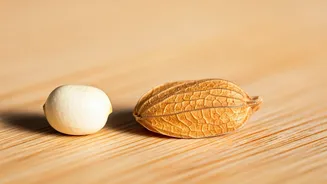Fiber Powerhouses Unveiled
Both Isabgol and chia seeds are renowned for their high fiber content, making them valuable additions to a balanced diet. Fiber, crucial for digestive
health, helps regulate bowel movements, prevents constipation, and can even aid in weight management by promoting a feeling of fullness. Isabgol, also known as psyllium husk, is primarily composed of soluble fiber, which forms a gel-like substance when mixed with water. This property is particularly effective in softening stools and easing their passage through the digestive tract. Chia seeds, on the other hand, contain both soluble and insoluble fiber. The insoluble fiber adds bulk to the stool, further aiding regularity, while the soluble fiber contributes to the overall benefits. The choice between the two may depend on individual needs and preferences, but both offer significant advantages in supporting a healthy digestive system. Considering the potential health advantages, including improved gut health and reduced risk of chronic diseases, incorporating either Isabgol or chia seeds can be a beneficial dietary choice. This also includes improved cholesterol levels and stabilized blood sugar.
Isabgol's Benefits Explored
Isabgol, derived from the seeds of the Plantago ovata plant, boasts several health advantages. Its primary function is as a bulk-forming agent, meaning it absorbs water in the digestive tract, which increases stool size and makes it easier to pass. This is particularly helpful for individuals experiencing constipation. Moreover, the soluble fiber in Isabgol can help lower cholesterol levels. By binding to cholesterol in the digestive system, it prevents its absorption into the bloodstream. This can reduce the risk of heart disease. The consumption of Isabgol may also help regulate blood sugar levels, making it beneficial for people with diabetes or insulin resistance. Because Isabgol promotes fullness, it can aid in weight management by reducing overall calorie intake. To consume Isabgol, it is commonly mixed with water or other liquids. Proper hydration is essential to ensure that the fiber can perform its function effectively. It is advisable to start with a small amount and gradually increase the dosage to avoid any digestive discomfort.
Chia Seeds' Nutritional Profile
Chia seeds, small black seeds originating from the Salvia hispanica plant, are nutritional powerhouses. They are not only packed with fiber but also rich in essential nutrients. These include omega-3 fatty acids, which are beneficial for heart health and brain function, and antioxidants. Chia seeds also provide a substantial amount of protein, making them a useful addition to vegetarian and vegan diets. They are a good source of several minerals, including calcium, magnesium, and phosphorus, which are important for bone health. The combination of fiber, protein, and healthy fats in chia seeds contributes to their ability to promote satiety, potentially aiding in weight loss efforts. Chia seeds can be added to a variety of foods and beverages. Their versatility allows them to be sprinkled on yogurt, added to smoothies, or used in baking. When chia seeds come into contact with water, they swell and form a gel-like consistency, which can further enhance their ability to aid digestion and promote a feeling of fullness. This adaptability makes them an easy-to-incorporate food for people seeking to improve their diets.
Fiber Comparison: Key Differences
While both Isabgol and chia seeds are excellent sources of fiber, their characteristics and effects vary. Isabgol predominantly consists of soluble fiber, which is known for its ability to absorb water and form a gel. This property makes it highly effective in relieving constipation. Chia seeds provide a mix of both soluble and insoluble fibers. The insoluble fiber adds bulk to the stool and contributes to promoting regularity. Regarding the overall fiber content, both offer a significant amount, making them beneficial for digestive health. However, the specific fiber ratio may influence their effects. For people who want to regulate bowel movements and prevent constipation, Isabgol might be a superior option due to its high concentration of soluble fiber. For those who seek a broader spectrum of fiber benefits, along with additional nutrients like omega-3s, chia seeds can be a complete option. The choice should be determined by individual dietary needs. It also takes into account personal preferences for taste and ease of consumption. Both seeds can be part of a healthy diet.
Choosing the Right Seed
The decision to choose Isabgol or chia seeds often depends on individual health goals and preferences. If the primary concern is constipation relief and you prefer a simple solution, Isabgol might be the better option. Its ability to form a gel-like substance ensures that bowel movements become easier and more regular. For those looking for a broader spectrum of nutritional benefits beyond fiber, chia seeds provide a compelling alternative. They are packed with essential nutrients like omega-3 fatty acids, antioxidants, and minerals, which can support overall health. Consider the ease of incorporating each seed into your diet. Isabgol is often mixed with water, while chia seeds can be added to a variety of foods and drinks. Personal taste also plays a role. While both are relatively neutral in flavor, chia seeds can add a pleasant texture to meals. Consulting a healthcare provider or a registered dietitian can provide personalized guidance. This ensures the best dietary choices align with specific health needs and goals. Furthermore, both can complement a healthy diet and lifestyle.













